I've updated my favorite playlist from last year, which I use for napping and driving to far off places. Here you'll find rock lullabies and indie performances, some edgier than others, many of which come from a playlist made by Drew Barrymore and Ellen Page. Their musical tastes intersect mine in curious ways, and so this list spins off theirs but definitely adds new things. I've provided youtube links to all the songs. I hope others may enjoy this playlist, and remember that music is good for your health.

1.
"Skeletons",
It's Blitz. The Yeah Yeah Yeahs. 2009. This album is a serious fan divider, claimed by many to betray the band's earlier sound, by others like myself as their best work to date. Edgy, post-punk songs like "Zero", "Dragon Queen", and "Faces" complement pristinely beautiful pieces like "Hysteric" and "Skeletons", the latter of which is one of my favorite songs of all time. It's transcendental in the way few songs attain, and Karen O's voice has an ethereal glide without sounding faddish or new-age. The regular version starts this playlist, and the acoustic version ends it, the perfect backbone.
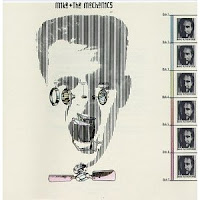
2.
"Par Avion",
Mike & the Mechanics. Mike & the Mechanics. 1985. Easily identifiable as an '80s album, but better than most of what passed for good music in a faddish decade. Popular songs like "All I Need is a Miracle" and "Silent Running" don't hold up well, but the almost unheard of "Par Avion" is a song I never tire of hearing. I doubt I could point to a simpler, more straightforward song that's so effective. The live version from Dusseldorf is a treat too, if you can locate a youtube clip of it. Mike Rutherford, of course, is the guitarist for Genesis, who by this point (with
Invisible Touch in '86) had sacrificed all originality for top-40 tripe.

3.
"Dandelions in Bullet Holes,",
All of Our Names. Sarah Harmer. 2004. This is an Ellen Page pick, and if not for her recommendation I would have never even heard of Sarah Harmer. She is apparently a Canadian folk artist and environmental activist. Says Ellen: "She's the person I've seen the most live out of any musician. I've loved her for a really long time. She is this absolutely gorgeous singer; her voice is unbelievable; live, she tears me to pieces. 'Dandelions in Bullet Holes' is a song specifically that came out when I moved to Toronto, and my best friend (my soulmate) and I would dance to this song in my living room." It's indeed a soothing song that eats its way into you, and essentially about the potential for peace despite ourselves.

4.
"Sawdust & Diamonds",
Ys. Joanna Newsom. 2006. Another one of Ellen's picks, and again her commentary will serve: "The one and f-ing only Joanna Newsom. Talk about someone with such a unique voice, and to be a harpist, and lyrically so ingenious, and so brilliant. I could choose any song by her, but 'Sawdust and Diamonds' is one I find staggeringly beautiful." And the
Ys album has been on too many "best of the decade" lists to name, not to mention the well known
1001 Albums You Must Hear Before You Die. After Dolores O'Riordan (next up), Joanna Newsom's voice is so uniquely gifted, it was like she was put on earth to spellbind with the power of song.

5.
"Ode to My Family",
No Need to Argue. The Cranberries. 1994. If you put a gun to my head and asked for my favorite song of all time, I would probably choose this one. Dolores O'Riordan owns the best singing voice in any rock band, and the Cranberries' first two albums would be among the top 40 I'd take to the moon if I had to choose. Though somedays I'd go with "Linger" as my favorite song, "Ode to My Family" is the one I can literally listen to anytime. The lyrics are simple and pure, crying out for childlike innocence from the perspective of an adult who has succeeded in the world.

6.
"Mountain Lions",
Restless Ghosts. Old Abram Brown. 2010. This indie album shows a group of college kids on the road to greatness. It's their second album and they're currently working on a third. I haven't been mesmerized by a slow-paced album opener like "Your House on the Hill" since Depeche Mode's "Never Let Me Down". But for purposes of this playlist, it boils down to a choice between "Little Feet" and "Mountain Lions". And I go with the latter: it's probably my favorite, and might even be the band's, since they actually recycled it from their first album,
Alive in Winter, but with sharper keyboard notes and percussion.

7.
"Trouble",
Mona Bone Jakon. Cat Stevens. 1970. Yet another Ellen pick, and I'm surprised to like it since I'm generally not fond of Cat Stevens. But I have to agree about the power of this song on account of its ties to the
Harold and Maude film, a classic that could only have been conceived in the '70s. It's about a love affair between a teen boy obsessed with death and who enacts fake suicides, and an old woman. The youtube clip shows Maude's death sequence from the film, and if it doesn't choke you up, you don't have your priorities straight.
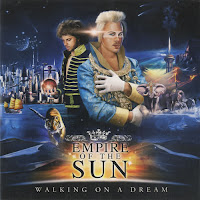
8.
"Walking on a Dream",
Walking on a Dream. Empire of the Sun. 2008. This is one of Drew Barrymore's picks, chosen on grounds of its universal appeal: "It's one of those right-out-of-the-gate songs you can't help moving and grooving to. If you're twenty or your forty, you dig it. It's a song that transcends age, and diverse enough to reach a huge group of people." That's saying something extra considering I'm hard to please when it comes to electronica music. But Drew is right, this is an instantly compelling song.

9.
"No More I Love You's",
Medusa. Annie Lennox. 1995. She's a legend, of course, and it seems unjust to represent her with a cover album, but the spin she puts on well-known hits takes them to incredible levels. Her performance of Lover Speak's "No More I Love You's" is pure art. Some days I think the Grey Havens piece she did for
Lord of the Rings is her best, but her voice is a bit brassy and grating on the high notes of the chorus. The Lover Speaks cover is beyond censure, and one of those songs you feel comes along once in a decade if that. Oh, and this also happens to be an Ellen Page pick.
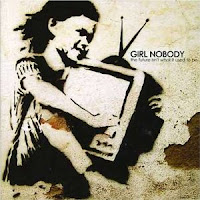
10.
"Smile and Beware",
The Future Isn't What It Used to Be. Girl Nobody. 2004. When you google this band, you get zip. And the album isn't even available through iTunes, though used CDs can still be found on Canadian amazon. Rush to purchase before it's too late; it's tragic that such a talented band broke up as soon as they made a mark. Songs like "Cages", "Why Am I Alone?", and "Carlucci" are pure magic. But "Smile and Beware" is on par with the best of The Cranberries, used brilliantly in the gritty Canadian TV series
Regenesis for a dying boy. The youtube clip actually plays the song over that scene, with a young Ellen Page shacked up in a motel with the boy -- incidentally, the best character she's ever played.
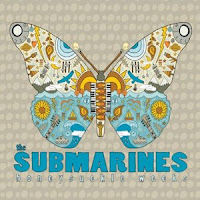
11.
"Xavia",
Honeysuckle Weeks. The Submarines. 2008. This indie duo has a curious history of romantic break ups and reunions, and their music chronicles this business on various levels. People who know me may be shocked that I'm choosing a song from their second album, which shakes off the sedate melancholy of the first in favor of bouncy and sunny songs like "You, Me, and the Bourgeoise". But it's really this one song which allows me to overlook the dominating glibness. "Xavia" captures perfection in a rare way, and though the word apparently means "bright" or "splendid", there's something subterranean going on in this piece too.
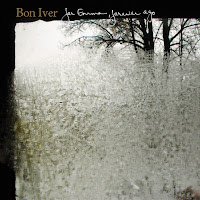
12.
"Rosyln",
For Emma, Forever Ago. Bon Iver. 2009. No, I most certainly have not seen the
Twilight films and never will. And here's another reason to shun those obnoxious teen vamps: I don't want this gorgeous song ruined. Every now and then comes along a stunning score for embarrassing cinema, but such a contrast hasn't stuck out to me like this since Peter Gabriel's
Passion for
The Last Temptation of Christ. Bon Iver is one of the best artists of the past decade, and I could just have easily chosen "Blood Bank" (Drew Barrymore's pick) or "Flume" (recently covered by Peter Gabriel). But "Rosyln" is their best, whatever cinematic baggage it carries.

13.
"Bring on the Dancing Horses",
Songs to Learn and Sing. Echo and the Bunnymen. 1985. By rights I should be using a song from the band's
Ocean Rain masterpiece, which was marketed -- only partly tongue-in-cheek -- as "the greatest album ever made". This song was the only new one on their greatest hits album following a year later, but in my view turned out even better than their best. The lyrics fascinate me; they seem to mean that when everything is going to hell, you need to bring out that last little trick that will upend everything against the odds. And I love the apocalyptic imagery, especially with the headless horsemen of Revelation. The singer almost takes on the role of the anti-Christ, taunting at the end, "Bring on the new messiah, wherever he may roam".

14.
"Safety Dance",
Rhythm of Youth. Men Without Hats. 1982. This is the absurdly crazy smash from my formative years that the lead singer wrote after he'd been kicked out of a club for dancing the wrong way. It's a bit silly, but so catchy and compulsive it still makes me want to bounce around when I hear it. I've also been obsessed with
The Manic Safety Dancer, the mysterious woman from the video who only appears for fleeting moments, dancing deliriously, almost like an embodiment of wild free spirit. To this day, her identity remains elusive, and I'm a member of her cult-following on Facebook; so I have some weird connections to this song. Be sure to watch the video in the youtube link.

15.
"Don't Let it Bring You Down",
Medusa. Annie Lennox. 1995. Yet again Annie is able to one-up her source material, this time Neil Young. The song is about the decline of a society, and emotional isolation, with an urge not to despair. The world goes on, even if it doesn't have the right to, or even if we've given up on it; that's my interpretation of this controversial '70s song, and Lennox does wonders with it. And the line about "it's only castles burning" is one of my favorite blase refrains of all time.

16.
"No Surprises",
OK Computer. Radiohead. 1997. Though there's a special place in my heart for the cryptic
Bends album before the coming of fame and glory,
OK Computer is clearly the band's best, and "No Surprises" is the foreordained song for this playlist. It's about being asleep, and plays like a lullaby, with xylophone chimes and slight foreshadowing of later inferior songs from Counting Crows and Coldplay. It's oddly reminiscent of the chord progressions heard on the previous
Bends album, and hints at a paradise where nothing changes, the news being equally good and bad.

17.
"Your Arms Around Me",
Night Falls over Kortedala. Jens Lekman. 2007. I don't know of a song so shamelessly sentimental and yet so good as this one. This Swedish singer serves up guitar-based pop with a heavy use of strings and horns, and romantic lyrics that draw me in even as I want to despise him. Then again, it doesn't hurt that this song was used effectively in Drew Barrymore's film
Whip It!, playing over Ellen Page and a lanky-looking dude diving into a swimming pool and having fun with each other, as they hold their breath for amazingly long periods, somersault, kiss and grope each other... you get the idea.

18.
"Skeletons" (Acoustic Version),
It's Blitz. The Yeah Yeah Yeahs. 2009. Many people think this version tops the original (#1), and some days I agree with that assessment, but the original is flawless in its own way. I also once heard it said that the original version is for nightmaring, the acoustic for day-dreaming, which is an interesting way of putting it to say the least. In any case, it's extremely rare for derivative versions to come close to outing a good original, let alone one a favorite, and so both versions of "Skeletons" proudly frame this playlist.

















